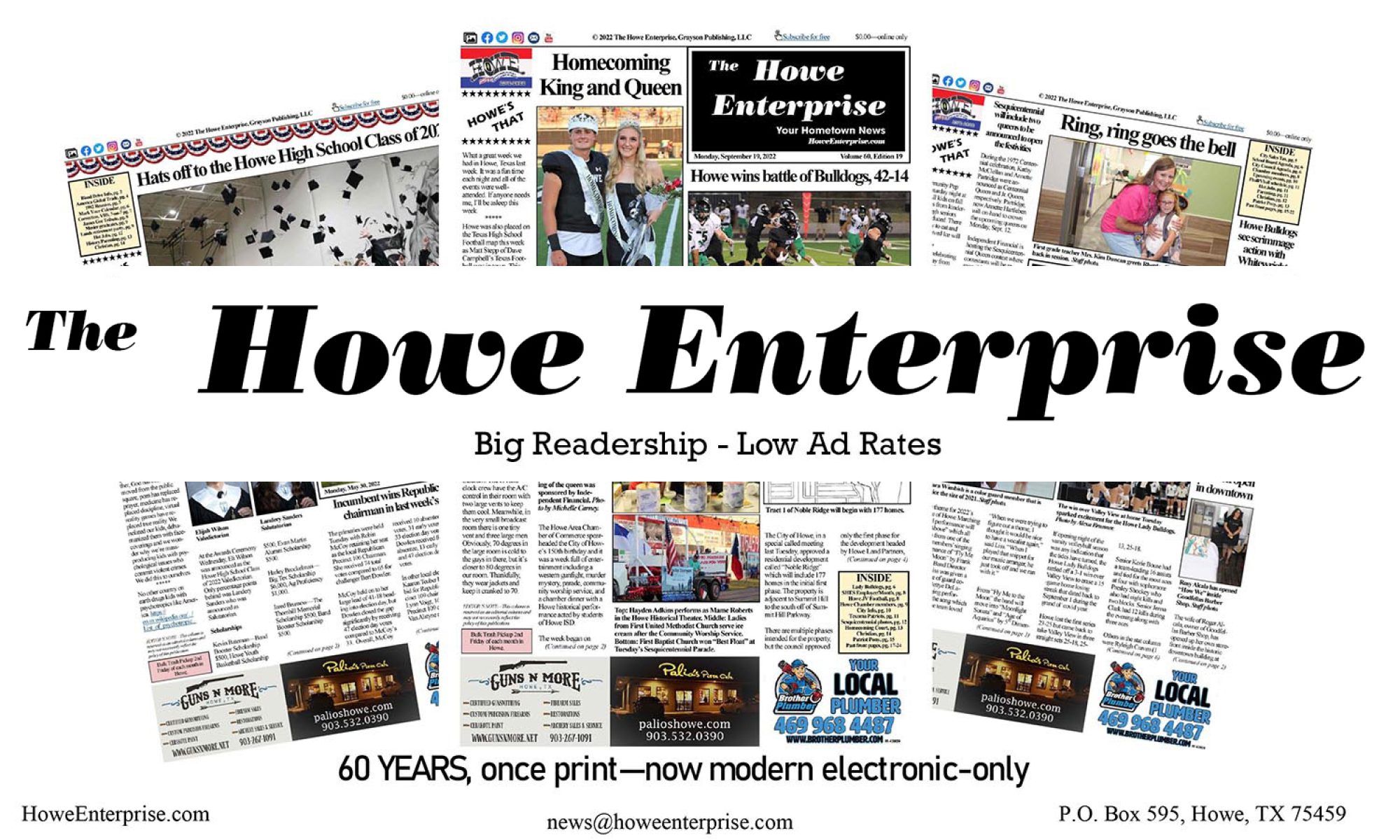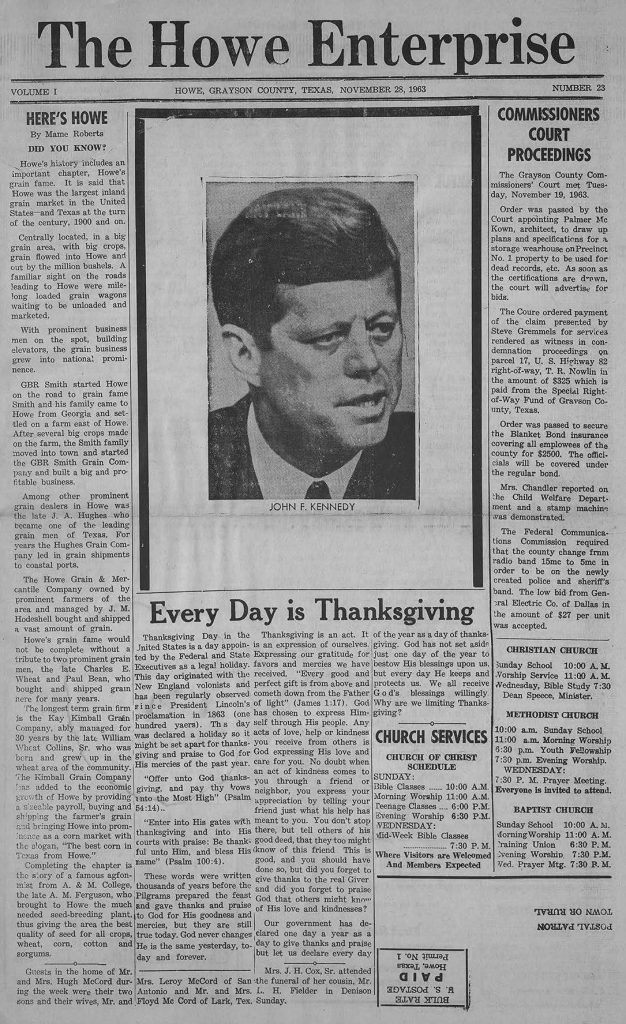Howe ISD taking applications for substitute teachers

Howe ISD is currently accepting applications for substitute positions for the 2019-20 school year. To be eligible for substitute placement, applicants must:
Be at least 18 years old.
Have a high school diploma or equivalent.
All applicants who meet the above criteria are required to attend mandatory training on Thursday, January 9, 2020, 9:00 am – 11:30 am in the Howe ISD Administration
Building before placed on the district’s substitute list.
Please print and fill out the forms PRIOR to training and bring to the training.
All applicants must provide the following:
Two forms of identification (i.e. Driver’s license, social security card)
Voided Check (for direct deposit)
Applicants who have a valid Texas Teaching Certificate must provide the following
before paid the certified substitute rate:
Copy of Transcripts
Copy of Valid Texas Teaching Certificate
You may contact Pauli Stephens at 903-745-4006 for additional information.
57.29 Howe Enterprise December 2, 2019
Billy Joe Wheeler, 1934-2019

Billy Joe Wheeler, 85, 0f Howe, Texas, passed away on Friday, November 29, 2019 in Denison, Texas. Billy Joe was born to the late General and Millie Wheeler on March 30, 1934. He married Lucy Jane Loftice on October 6, 1955 in Van Alstyne, Texas and shared 60 wonderful years of marriage with her. Billy Joe had various jobs until he went to work at Conagra where he worked until his retirement. He and Lucy made their home in Howe, Texas, where they raised their four children and he was an active member of the church and community. Billy Joe loved his home and family where Christ was always the center. He was a member and Deacon at First Baptist Church in Howe and ministered to all he met through his words and actions. He had a true servant heart and served those around him happily. Billy Joe loved the Lord and shared this love freely to all that could hear. He will be dearly missed by many.
He was proceeded in death by his wife, Lucy Wheeler, his parents, General and Millie Wheeler, brothers, J.W. Wheeler, Lee Roy Wheeler, Dolan Wheeler, Vernon Wheeler, Eugene Wheeler, and sisters, Velma McCluskey and Juanita Vinyard. He is survived by his daughters, Anita Bickenbach and husband Mark, of Van Alstyne, Paula McCollum and husband Mike of Howe; sons, Michael Wheeler and wife Charlotte of Garland, and Mark Wheeler and wife Kelly of Denison; 8 grandsons, 2 granddaughters, 11 great-grandchildren, and numerous nieces and nephews.
Funeral services will be held at 2:00 PM Tuesday, December 3, 2019 at the First Baptist Church in Howe with Art Rayburn, officiating. Burial will follow in the Van Alstyne Cemetery. The family will receive friends Monday, December 2, 2019 from 6:00 to 8:00 PM at Scoggins Funeral Home in Van Alstyne, TX.
Pallbearers will be his grandsons, Jason Bickenbach, Jared Bickenbach, Justin Bickenbach, Glenn McCollum, Zach McCollum, Chase Wheeler, Colton Wheeler, and Camden Wheeler. In lieu of flowers, donations may be made in his memory to First Baptist Church Howe, PO. Box 247 Howe, TX, 75459, or the Van Alstyne Cemetery Association, PO. Box 1495 Van Alstyne, TX, 75495.
Services are under the direction of Scoggins Funeral Home & Crematory, 637 W. Van Alstyne, Pkwy. Van Alstyne, TX, 75495. 903-482-5225. You may sign the online register book at www.scogginsfuneralhome.com.
The ideal citizen – the story of Billy Joe Wheeler
Originally published July 8, 2019 in Volume 57, Edition 8.
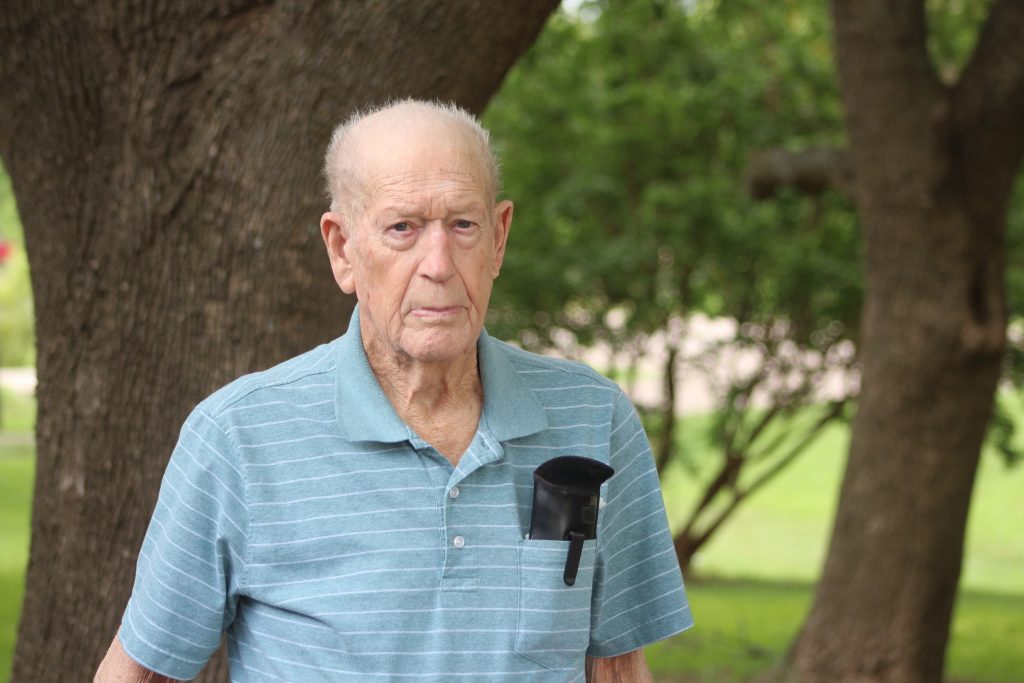
Billy Joe Wheeler’s story is a unique one. He’s a man who left school in the eighth grade and became a board member of Howe Independent School District and a city councilman for the City of Howe. Born to nomadic dirt farmers, he vowed not to raise his kids from town-to-town but used his childhood farming expertise to plant deep and strong roots for his family in one city, one school, and one church. Volunteering for nearly everything and anything that had to do with Howe, his kids, or friends, Wheeler, now 85, lived his life as what community developers refer to as “the ideal citizen.”
Wheeler was born in Anna, Texas in 1934 to Marion Frances “General” and Melvina “Mellie” Victoria Wheeler, but didn’t stay there long. As a matter of fact, he didn’t stay anywhere very long as a child.
“My dad always seen the grass greener on the other side somewhere,” said Wheeler.
Their travels took them to East Texas, West Texas, and Stillwater, Oklahoma before finally settling down at Elmont (east of Van Alstyne). His first schooling began when he had to walk four miles as a first grader to Lone Star school near Weston. “There were trees grown over this muddy wagon trail and I’d walk there every day,” said Wheeler. “Then we moved to Oklahoma and all over. I even went to Howe for a little while.”
Wheeler’s sense of work came at an early age in the cotton and cornfields with a one-row planter. They had no electricity, only the coal oil lamps that he despised.
“I told my dad when I was 16 that I didn’t want to be a farmer,” said Wheeler. “He said, ‘Son, I wouldn’t say that because one day you might be glad to get on the farm.’ I said, “I might get on it, but I won’t be glad.'”
After working a few years in Dallas after deciding to leave the farm, he met Lucy Loftice in 1955 at Elmont Baptist Church and married her in October the next year. He quit a good-paying job with General Motors and moved to Howe to begin his life as a family man.
“I thought if I was going to raise kids, I didn’t want to raise them up down there in Dallas,” said Wheeler.
He went to work with Fant Milling Company in Sherman who was later purchased by Con-Agra.
“That was good for us because we got a big raise,” said Wheeler. Their first child Nita was born in the latter part of 1956 followed by Michael, Paula, and Mark.
When Wheeler arrived in Howe, there was not a bank, but there were three grocery stores – all in the downtown area.
Once he got settled in Howe, he purchased a downtown building, was elected to the school board and city council. He and Lucy also joined First Baptist Church in Howe where he later became a deacon.
As a city councilman, Wheeler pushed for a water line that was proposed to run west of the railroad tracks along Old Highway 6.
“I guess we didn’t have the money, but that line would have paid for itself in a hurry with all of the homes that were built out there,” said Wheeler. “We did some good things and some bad things. We could’ve done it better.”
One of the hardest things for Wheeler was being on the council when Howe Police Chief Ken Vickers was let go of his duties.
“I voted for him to stay because I was hoping he could get things turned around. We had a room full, but we had to let him go and that was hard to do,” said Wheeler.
He says the best thing that ever happened to his family was joining First Baptist Church in 1956. He’s served in just about every capacity there is from teaching Sunday School to the youth and helped with the elders.
“Harry (editor’s note – pastor’s name was Claude) Cone was the preacher there and he left two weeks after we joined,” said Wheeler. “He and Jack Norman came down and visited us about joining. We needed to get into church. We had kids and that’s the best thing you can do. If you’re not going to church, you need to get in a church.”
Wheeler says he was saved as a child in Elmont but was too young.
“I was drug down the aisle in Hess, Oklahoma,” said Wheeler. “I went down a sinner and come up a sinner. I was just a kid”
Later in life when his son Michael was baptized, Wheeler was baptized the same day. “I knew there was something lacking, so that’s why I did that,” said Wheeler.
In the mid-1970s, he worked alongside Gerald Hickox and Norman Dickey and others to construct Bicentennial Park where now sits Hash Field, North Field and a t-ball field. While volunteering to coach baseball, he once hit a fly ball to a young kid that bounced hard off his forehead. That little kid grew up to be Mayor Jeff Stanley.
“I went down to one of the council meetings a few years ago and told him, ‘I know I hurt you bad, but I didn’t know I hurt you this bad,'” Wheeler joked.
Tragedy struck Wheeler in March of 2016 when he lost his wife Lucy of 60 years.
“It’s like losing half of your life,” said Wheeler.
He found himself having to do things he never thought of such as cooking, cleaning, and housework. He says he eats out quite a bit now, but he can cook and bake a cake.
“I can do about anything if I want to,” said Wheeler who quickly changed the subject to his grandkids who he obviously cherishes and the time he gets with them.
Howe Bulldogs football is one thing that Wheeler has seen a lot of over the years. As his eyes looked off to the left, he began to talk about the 1970 regional championship team and of Rick Hanning’s high punts. Asked if that was the best team he’d seen; he began to stir over the 1985 Bulldogs team that his son Mark was a part of. With the team down 16-14 in the regional championship game against Groveton with seconds remaining and Howe within field goal range, Wheeler still believes Howe should’ve won that game in Corsicana.
“Groveton was pretty good, but I thought we were pretty good though,” said Wheeler. “If they’d have let him (Mark) try it, we’d have probably won the ballgame.”
Wheeler said he’s still a Bulldog fan and hopes Howe will do a better job of keeping their coaches.
As anyone who lives a long life, they begin to see their friends pass away and it’s been hard for Wheeler. He was recently shocked by Chuck Pelkey’s death and recently witnessed friends such as Norman Dickey and Marion Allison pass away.
Wheeler, himself, experienced bad health recently when he fell in his home which caused a bleed in his esophagus. Daughter Paula took him to the hospital where he stayed for two weeks before going to physical therapy. He’s back at home now and has a walker that he uses, although he says he doesn’t need it.
After years of driving his friends to the doctor and refusing money for anything he did, he’s now the one that has people checking in on him. The kids that he and Lucy reared in the church and disciplined are now the ones taking care of the ideal citizen who is aging. Howe needs more Billy Joe Wheelers.
Billy Joe Wheeler passed away November 29, 2019.
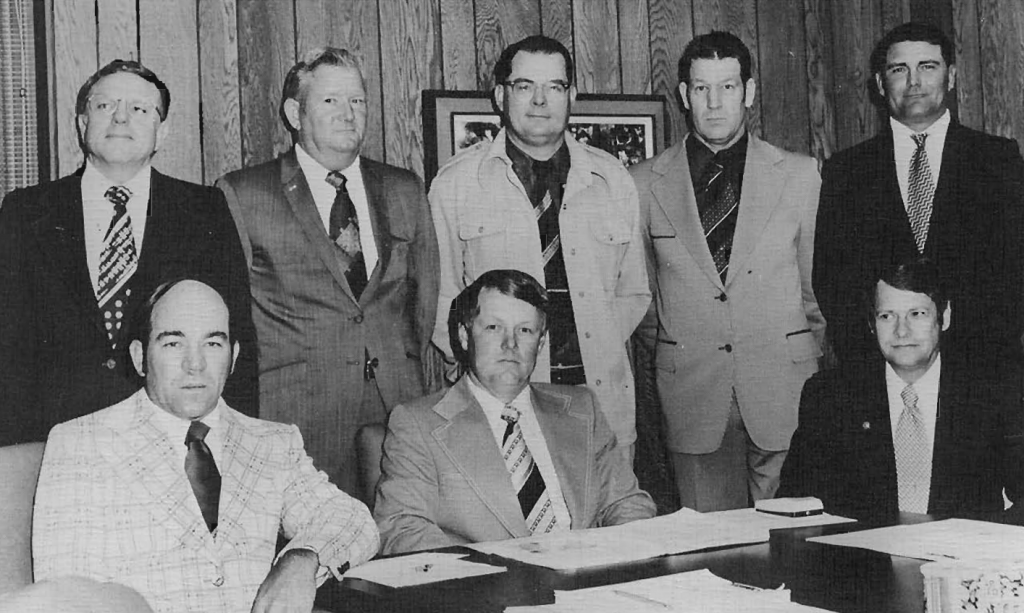
Gene “Bubba” Bridges, 1955-2019
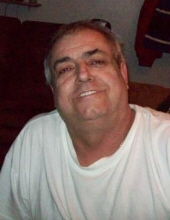
Gene “Bubba” Bridges, age 64, of Sherman, passed away on Monday, November 18.
He was born to the late Ruby Nell Bridges and Floyd Gene Bridges on July 3, 1955 in McKinney, Texas. Bubba attended Blue Ridge, Van Alstyne, and Howe public schools, and then joined the Army where was honorably discharged. He married Lezlea Mathis and they had two children together.
Bubba was preceded in death by his mother, Ruby Bridges; his father, Gene Bridges; his sister, Debbie Bridges; his son, Jason Bridges; and a great-granddaughter, Braylee. He is survived by his grandson, Quincy Williams of Sherman, his daughter, Alissa Bridges of Sherman; his granddaughter Angelina Williams of Sherman, his daughter Teresa Reed and husband David of Fort Worth; his grandchildren, Jason Burnett, Justice Burnett, and Todd Krause; his siblings, Rose Marr and husband Dennis Marr of Sherman; Sherry Kelley of Sherman; and Billy Bridges of Dallas, and numerous great-grandchildren.
Benny Jo Risner is officiating the graveside service that will be held at Coffman Cemetery in Anna, Texas at 1 pm Nov 30.

57.28 Howe Enterprise November 25, 2019
The 1892 hanging of a Grayson County man who murdered the Bells town marshal
A man entered the Pacific Hotel in Bells, Texas on Jan. 14, 1891 with a cocked revolver and ordered the parties present to hand over their wealth. After securing W.D. Elliott’s watch, Jim Isbell, the town marshal, also bartender, got out his pistol, when the robber fired, hitting Isbell on the right cheekbone, breaking the bone fearfully and knocking out the teeth on that side. The ball exited the back of the head. The marshal was murdered.
Mr. Keener, the lunch stand keeper at the same place, caught hold of the robber at this juncture, and in the scuffle secured his pistol, when the robber broke from him and ran, but was pursued by a black man. John Martin, who was in the saloon and whom the robber had forced to search the parties while he held his pistol on them. Martin pursued and overhauled him and held him until help arrived when he was secured and brought back.
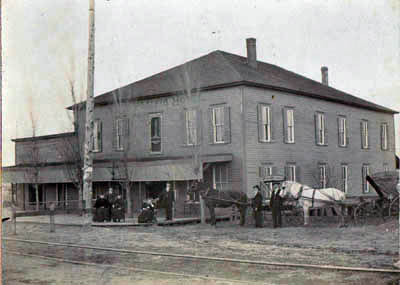
The robber, George Smith, lived in Choctaw, Grayson County for approximately six years, as reported by the Galveston Daily News. Choctaw was located about seven miles east of Sherman with a population of 42 with three businesses.
An indictment came forward in late April 1892 which contained two counts, one charging murder upon malice aforethought, and the other a murder committed in the perpetration of robbery. The court, after submitting the issue of a killing upon express malice, further charged as follows:
“You are also informed that if you believe from the evidence that defendant with malice aforethought and in the perpetration of robbery shot and killed James Isbell with a pistol, then he would be guilty of murder of the first degree, although you should believe that Isbell fired the first shot.” This charge presented the law of the case.
The evidence in the case was insufficient to raise the issue of insanity but had it been otherwise, there was no error in instructing the jury that the defendant must “clearly” prove he was insane. A new trial was asked on account of the newly discovered evidence of one Kempton, who was confined in jail with the defendant several months before trial and who will swear that he had reason to believe from the acts of defendant that he was insane. The defendant certainly knew he was in jail with Kempton and he was chargeable with diligence. There was no error. Affirmed.
Capt. J.D. Woods, attorney for George Smith, in jail, awaiting the sentence which will fix the day of his execution, visited his client’s cell at the Houston street jail on May 1. Capt. Woods remarked as he saluted the condemned man who was sitting on the farthest side of the cell:
“Well, Smith, the court of appeals have affirmed your case.”
“Yes, I have been expecting that for some time,” and after a pause during which he rather pleasantly smiled he added: “When will the day be set?”
“It will be several days before the mandate gets here and then after the sentence is passed upon you it will be at least thirty days until the day set by the court comes around,” responded the attorney.
“Oh, well, but I don’t see why they should be so long about it, but let’s see,” he added laughingly, as he counted away on his fingers, “that will throw it into warm weather which will be nicer.”
Capt. Woods volunteered the statement that he would endeavor not to have the execution come off the same day with Massey, and Smith responded:
“That hole out there isn’t hardly large enough to drop more than one through.”
He stated that he didn’t care to see a preacher and that he had a Bible but would like to have some magazines to read. He said he had read so many novels he was sick of them.
George Smith, sitting in that jail on Houston Street in Sherman had all along maintained indifference when approached upon spiritual matters. Rev. J.A. Ivey, pastor of the Second Baptist Church, who had quite a consultation with the condemned man.
After fervent prayer, as the minister was preparing to leave, Smith asked him to come again, saying: “I believe you are really interested in me and did not come just out of curiosity, as so many have done.”
In late May 1892, Sheriff McAfee entered the district courtroom and just behind him came a clanking of shackles and the thin form of Smith, while in his read came Warden McKinney. The prisoner entered the dock, where Smith sat down and by his side, faithful to the very last, was his appointed counsel. The court said:
“Before proceeding in the case of the state of Texas against George Smith, I deem it well to speak of another case lately tried in this court. I refer to the case of the state of Texas against Sam Massey. Since his trial and within the last few days it has come to my knowledge that Sam desired to appeal his case. This is a privilege I would not refuse any prisoner, and I have ordered the sheriff to remove the prisoner beyond the jurisdiction of this county, and this he has already done.”
The courtroom was as still as the tomb but faces that had looked stern at Smith now looked with compassion perhaps it was a comparison of the two crimes. Smith had killed an able-bodied man, but Massey most brutally assaulted, endeavored to murder a family and tried to burn the house with the occupants, every one of whom he had left in an insensible condition.
The court motioned for George Smith to stand up. He did so and every eye was upon a pale face nearly covered with a growth of dark whiskers. The court said:
“George Smith, some time since a grand jury of Grayson County, TX, found a bill of indictment, charging you with the murder of James Isbell, in this county. You were given a trial before a petit jury and by them found guilty of murder in the first degree and the punishment assessed at death. A motion for a new trial was presented and after a hearing overruled. The case was appealed to the highest tribunal in Texas and by them affirmed. Is there any reason why the sentence of the court should not be passed upon you?”
The prisoner looked at the court squarely in the face and answered, “No, sir.”
“It is then my duty to remand you to the custody of the sheriff, to be by him held until Friday, the 8th of July, when within the hours prescribed by law you shall be hanged by the neck until dead.”
There was a clanking of chains, a rattling of shackles, and George Smith went back to jail to drag out the six weeks of life left to him.

About the same time in late May 1892, a petition for the commutation of the sentence of George Smith to life imprisonment had still been circulating, but a counter-petition protesting against any change from the verdict of the jury, signed by nearly everybody in Bells and vicinity, was presented to the governor as he passed through Bells. It is also stated that the governor was shown the room in which the killing took place. His excellency, of course, said neither yea nor nay…
George Smith, who was to hang July 8 was still cheerful at that time and remained that way as he entered upon his last night on earth with all the calm exterior that he has evinced since the very beginning. He had talked but little of himself. He selected a dark blue suit for the trap that was to be sprung at 2:30 pm the following day. It was thought for a while that he would select a soft flannel shirt, but a white shirt with a turndown collar was finally selected.
It had been over thirteen years since a man suffered the death penalty in Grayson County, the last being a man named Toettle, who killed Julius Brennan in Denison.
George Smith, the condemned man, was standing with his hands placed against the cell grating gazing out of the east window when the sun went down on his final day. Silently he stood and gazed until the tints and reflections in the clouds began to dim and the shadows of evening crept into the cell. With a deep-drawn sigh, he turned, placed two or three times across the iron floor and then sat down.
For just a few moments he bowed his head once in his hands and then arising he began chatting pleasantly with the deathwatch and his fellow cellmate, Henry Garbalt.
He was the same stout-hearted George Smith again. He talked a great deal about the preliminaries of the execution. He desired of Watchman Reidnoir to know why it was necessary to place a black cap over his head and if this was to prevent his seeing the execution. He was told that sometimes the face of those who were executed would become distorted and that it was not desired to have anything more than necessarily unpleasant attending an execution. He replied that this was certainly right.
He wanted to know why he would be executed in his stocking feet and rather laughingly remarked that he supposed they would have let him die with his boots on. He ate supper with apparent relish at the usual prison hour.
He had several little delicacies furnished him on his final day. It had been his custom to talk to the deathwatch until 10 or 11 pm in the evening and his last night was no exception. The general drift of his conversation did not differ from what it had been all along.
Occasionally he simply remarked: “This is my last night here.” This he said without the least signs of weakness.
At 11 pm he bade the watch good night and went to sleep. His rest was practically unbroken and the watchman in the after part of the night noticed nothing unusual in the actions of the prisoner. He arose at 7 am, or perhaps a little earlier on his final morning. He saluted his fellow prisoners very pleasantly and passed a cheerful “Good morning” to the watchman outside. He ate the regular breakfast and was favored again with quite a number of little delicacies.
At 8:30 am he was shaved and very soon after received his attorney, Captain J.D. Woods, who inquired if there was any word or message, he desired to send to anyone. To this, he made his stereotyped reply: “There is nothing that I wish to say; it would do no one any good.”
A cigar was offered him that morning, but Smith remarked that it was a habit he had never indulged in, accepted the preferred weed, but handed it to Garbalt, his cellmate. Several times he has asked if he would be allowed to see his coffin. When Dr. E.H. Winn, the prison physician was called, Smith’s face lit up in expectancy. He began a careful and detailed inquiry of the sensation experienced by a man when undergoing execution by hanging. He desired to know the length of time required for death to ensue or if unconsciousness came before death.
He seemed gratified at the explanation of the physician that death was practically painless and said he had heard so. With the assistance of Garbalt at 9 am, he began to dress in his desired dark blue suit.
By 10 am he was fully attired, and George Smith was decidedly a handsome man.
Shortly after noon, Smith finished eating a hearty meal, in which there were a number of delicacies and any little thing he expressed a desire for.
At 2:08 pm Drs. Winn and King were admitted and injected one-fourth of a grain of morphine into his arm. At 2:18 the sheriff, accompanied by the newspaper men present, went to the cell, and there the death warrant was read.
When the Sheriff had finished and turned away, Smith took one or two strides across his cell and taking his handkerchief, wipe the perspiration from his brow. It was 2:23 when the iron door of the cell was swung open and Smith with a firm step came out and walked with the sheriff to the iron trap. Of all in the crowd, there is little doubt that he was as cool and collected as any man there. He stepped upon the door, and at the request of Sheriff McAfee, turned his face to the east. He said nothing but looked around and scanned the crowd. He was still cool, and as the deputies were pinioning his legs, he looked at them intently. When they began to tie his arms, he remarked:
“Wouldn’t you just as soon tie them in front of me?”
When told that they would have to be tied behind him, he said, “All right,” and requested that they be more securely pinioned, which was granted. His limbs having been tied the prisoner straightened up and as the black cap was being placed on his head, he looked at Rev. Gibbs, who stood near him, and said: “Goodbye, Mr. Gibbs.” Then the black mask came down and George Smith had looked for the last time on earth.
When the cap was being adjusted, he said: “A fellow can’t breathe much in this,” and his last words were, “That is pretty tight,” as the knot was drawn down by the sheriff.
At 2:23 the trap was sprung, and the body shot with rapidity through the open door. The rope tightened up and gave the body a swing, but not a muscle quivered in the suspended body. There was none of the terrible twisting and writhing which usually sicken spectators.
For thirteen minutes there were evidences of a beating pulse. In fifteen minutes, he was pronounced dead by his prison physician and his assistants. His body was immediately cut down and placed on an iron cot brought in from the hospital. His neck was found by the physicians to have been broken and Dr. Winn said to the reporter: “He suffered no pain in dying.”
In a few minutes, the body was placed in a nice coffin, provided by a public subscription, and was turned over to some of his old friends and neighbors in Choctaw, where he was taken for burial. There was not a single event of any annoying nature in the whole execution, which was very successful.
Hanging has been practiced legally in the United States of America from the nation’s birth, up to 1972 when the United States Supreme Court found capital punishment to be in violation of the Eighth Amendment to the United States Constitution. Four years later, the Supreme Court overturned its previous ruling, and in 1976, capital punishment was again legalized in the United States. Hanging has returned to the states of Washington, Delaware, and New Hampshire.
*Research attributes to YesterYearNews and the Galveston Daily News.
1.23 Howe Enterprise November 28, 1963
North Texas multi-task force disrupts contraband commute netting nearly one thousand pounds of marijuana
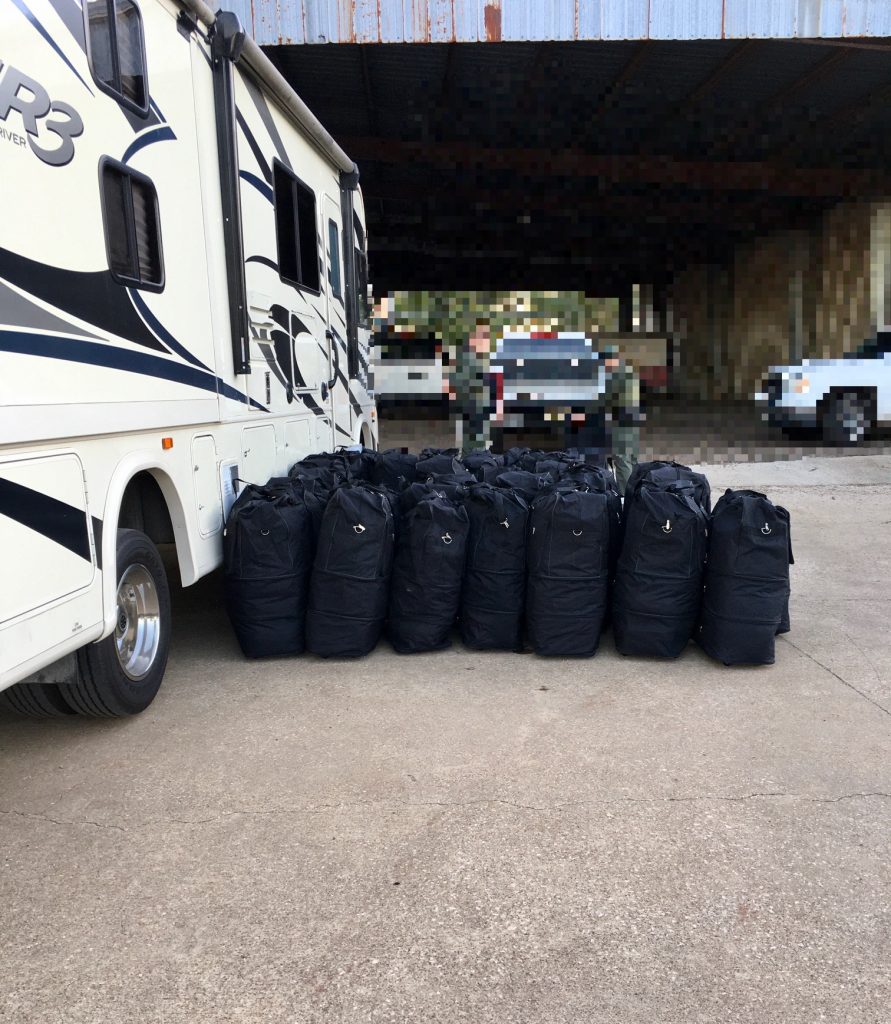
On November 18, 2019 at approximately 3:00 pm, while conducting a highway criminal interdiction operation in North Texas, members of the North Texas Sheriff’s Criminal Interdiction Unit (NTXCIU) conducted a traffic stop on a recreational vehicle. While speaking with the driver, an NTXCIU deputy suspected that criminal activity. The driver of the recreational vehicle consented to a search and approximately 976 pounds of marijuana and over 2,000 dosage units of THC concentrate vaping cartridges were discovered. One subject was arrested. The origin of the contraband was California with a final destination of Georgia.
In December 2017, Collin County Sheriff Jim Skinner, Grayson County Sheriff Tom Watt, Hunt County Sheriff Randy Meeks, Parker County Sheriff Larry Fowler, Rockwall County Sheriff Harold Eavenson, Smith County Sheriff Larry Smith, Tarrant County Sheriff Bill Waybourn and Wise County Sheriff Lane Akin came together to formulate a plan to help stem the flow of illegal narcotics and human trafficking victims being transported across the open highways and Interstates of North Texas. Concerned about human trafficking and the opioid epidemic that is afflicting the Nation, these Sheriffs agreed to combine their resources and create the North Texas Criminal Interdiction Unit (NTXCIU): a team of specially trained deputy sheriffs whose mission it is to interdict dangerous drugs, narcotics, contraband and human cargo on established smuggling corridors across North Texas. This eight-agency initiative is the first of its kind in Texas and the United States. An integral part of this initiative is the cooperating Sheriff’s agreement that any of the deputies assigned to this unit have jurisdictional authority to operate and make arrests within any of the participating counties.

